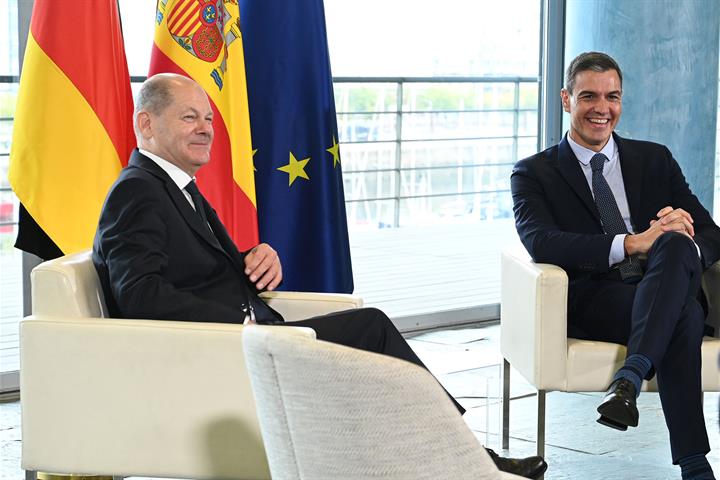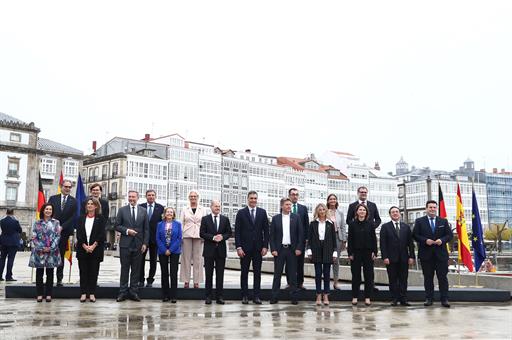Spain and Germany strengthen their already deep bonds of union and defend a progressive social Europe
President's News - 2022.10.5
A Coruña (Galicia)
This is the first time since 2013 that this format of bilateral meetings at the highest level has been revived. It comes at a crucial time for Europe, marked by Putin's invasion of Ukraine, the energy crisis, inflationary tensions, the need to reform the EU's electricity market, energy supply difficulties and the strengthening of Euro-Atlantic unity in security and defence.
Spain and Germany are experiencing a moment of great political harmony, with two coalition governments of progressive identity expressing deep collaboration and closeness.
The summit marked the third bilateral meeting between Pedro Sánchez and Olaf Scholz in 2022, following Scholz's visit to Madrid in January last year -a few weeks after being elected chancellor - and this August's invitation to President Sánchez -unprecedented until then with any other Spanish leader- to attend the German Council of Ministers in Meseberg. On 14 October, the two leaders will meet again in Berlin.
In addition, this October will see the State visit of Their Majesties the King and Queen of Spain to Germany, where they will take part in the 10th German-Spanish Business Forum and the Frankfurt Book Fair, where Spain is this year's guest of honour.
"Never has the relationship between our countries been closer or has there been such deep understanding and collaboration. These relations are based on our intense social and economic interaction, on a shared European project and on a common vision of the international order based on rules and multilateralism," Pedro Sánchez underlined.
Our economic and trade relationship is also excellent, although we still need to aim at surpassing pre-pandemic figures, such as in the area of tourism.
Germany is Spain's largest supplier and the second most important destination for our exports. The German market is also very attractive for Spanish investors, where leading Spanish companies are already operating.
Many Spanish companies can offer their proven international expertise in fields such as sustainable infrastructure, water sanitation and green energy, as well as provide attractive opportunities and play a major role in the supply diversification decisions of German companies to secure their value chains.
European response
 The President of the Government of Spain, Pedro Sánchez, and the Chancellor of Germany, Olaf Scholz, during their meeting in the framework of the XXV Spanish-German Summit | Pool Moncloa/Borja Puig de la Bellacasa
The President of the Government of Spain, Pedro Sánchez, and the Chancellor of Germany, Olaf Scholz, during their meeting in the framework of the XXV Spanish-German Summit | Pool Moncloa/Borja Puig de la Bellacasa
These excellent relations between Spain and Germany and the political closeness between the progressive governments of the two countries strengthen the EU, increasing its overall potential regarding seeking answers and addressing debates far removed from bloc dynamics in a context of extreme complexity on the continent, due to the threat posed by Putin. This singular situation is ahead of the Spanish Presidency of the EU in the second half of 2023.
"In European affairs, when Spain and Germany walk hand in hand, there is great potential for unblocking agreements and advancing integration," the president highlighted.
Putin remains determined to make the situation worse for Ukraine, for the rest of Europe and also for Russia itself. The situation's recent escalation, with the partial militarisation of the Russian population, the sham referendums in the occupied Ukrainian territories and the decree on their annexation only increase the region's pain, destruction and number of deaths.
"Spain does not and will not recognise this unilateral border change that is contrary to international law, and will continue, like Germany, to help the courageous Ukrainian people in their defence of democracy, legality and human rights," insisted Pedro Sánchez.
Energy and solidarity
The President of the Government of Spain also reiterated that "the situation in Ukraine affects the well-being and quality of life of our citizens". This is why Spain defends the need to make determined progress in reducing dependence on Russian hydrocarbons, decarbonisation and the green transition, the reform of the European electricity market and the achievement of affordable prices for industry and domestic consumers, especially the most vulnerable.
President Sánchez stressed that Spain does not have a strong dependency on Russian gas. It is precisely this situation that puts our country in a better position to show solidarity with the other EU members.
The President of the Government of Spain, Pedro Sánchez, during the press conference together with the Chancellor of Germany, Olaf Scholz | Pool Moncloa / Borja Puig de la Bellacasa
"Spain's Europeanism stems from conviction. For us, Europe is first and foremost a community of values, which are today challenged on many fronts. Not even in the most difficult and complex moments of recent history has Spain's commitment to the European Union wavered. Now, when it is most needed, Spain is more willing than ever to help," said Pedro Sánchez.
Unfortunately, the lack of connection infrastructures with Europe currently prevents Spain's full potential in electricity, gas, renewable energy and, in the near future, green hydrogen from being exploited. These interconnections must be developed as "the only way to achieve a European energy market", explained the President of the Government of Spain.
Joint Action Plan
Spain and Germany have adopted a Joint Declaration that has an ambitious Action Plan attached to it, which structures and renews the bilateral relationship through multiple initiatives in different areas. The plan, which has an eminently practical vocation and concrete actions to be carried out by both countries, has been drawn up with the participation of all government ministries.
Together with President Sánchez, the three Vice-Presidents of the Government of Spain and the Ministers for Foreign Affairs, European Union and Cooperation; Industry, Trade and Tourism; Defence; Agriculture, Fisheries and Food; and Universities also took part in the Summit, holding meetings with their counterparts from the German federal executive.
Pedro Sánchez has particularly highlighted the documents signed on socio-labour issues and higher education and training. "Improving working conditions and promoting dual lifelong university education are two areas where our two governments are equally ambitious and where both countries can learn from each other," he said.
The Action Plan reflects the values shared by Spain and Germany, the common vision of both countries based on "a geopolitically strong, sovereign and united Europe as a bulwark of the rules-based international order", working closely together "for our common goals and objectives".
Plenary meeting of the XXV Spanish-German Summit | Pool Moncloa / Borja Puig de la Bellacasa
Both countries are committed to increasing collaboration in foreign policy and development cooperation, contributing to peace and international security through the defence of multilateralism, the commitments acquired in NATO and the EU, and the promotion of a feminist foreign policy.
The Spanish and German foreign ministries will work together on the 'Team Europe Initiative for Good Jobs' as part of the Southern Neighbourhood, cooperation in civilian crisis management and the promotion of joint initiatives within the UN, especially in the areas of human rights and non-proliferation.
In the current context of the energy crisis, the adopted text expresses the willingness of Spain and Germany to intensify bilateral cooperation on energy and climate, particularly in the fields of energy efficiency, renewable energies, energy storage and green hydrogen.
With respect to the renewable hydrogen industry, Spain and Germany have underlined their commitment to the need to explore opportunities to favour its expansion, with a commitment to greater interconnection between the Iberian Peninsula and the rest of the EU to boost Spain's contribution to the security of European supply as a whole, both for electricity interconnections and, in particular, through a renewable hydrogen corridor that will cross the Pyrenees, already identified in the 'RepowerEU Plan'.
The Joint Action Plan also expresses concern about the current food crisis, food prices and problems of availability of agricultural supplies and inputs as a result of the invasion of Ukraine. Both Spain and Germany have acknowledged the need to ensure the export of grain to world markets by road, rail or ship. In addition, in a context of climate change, the Summit analysed the use of new technologies in plant production to generate higher yields, which will ensure future production with less use of inputs, including water.
Non official translation





